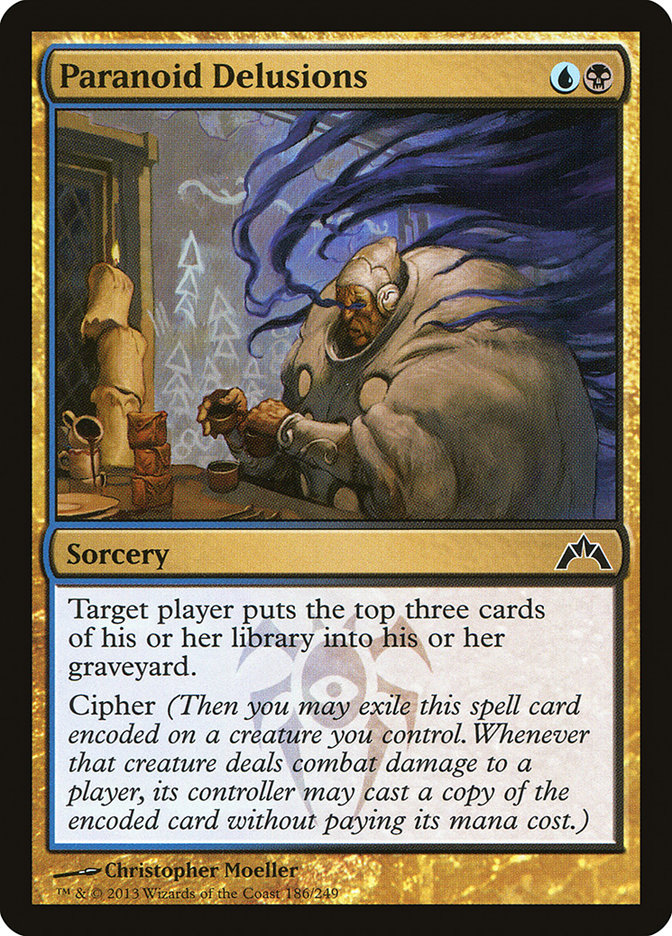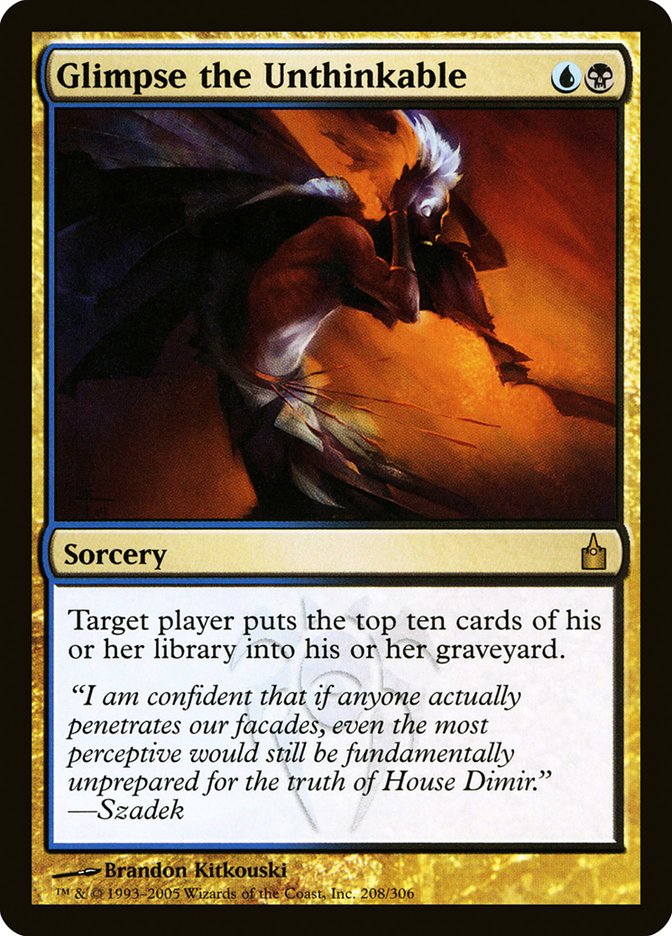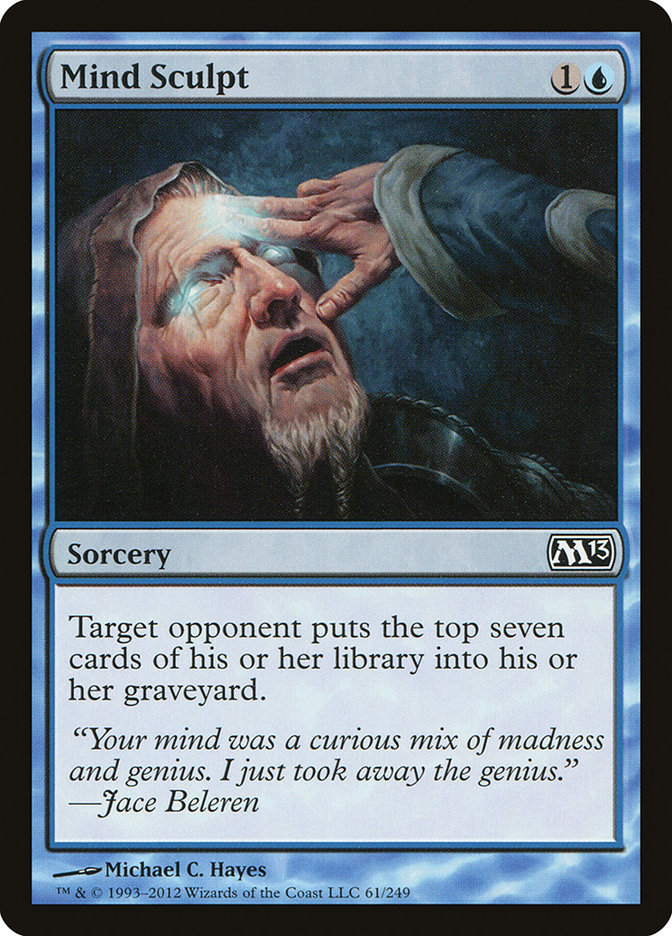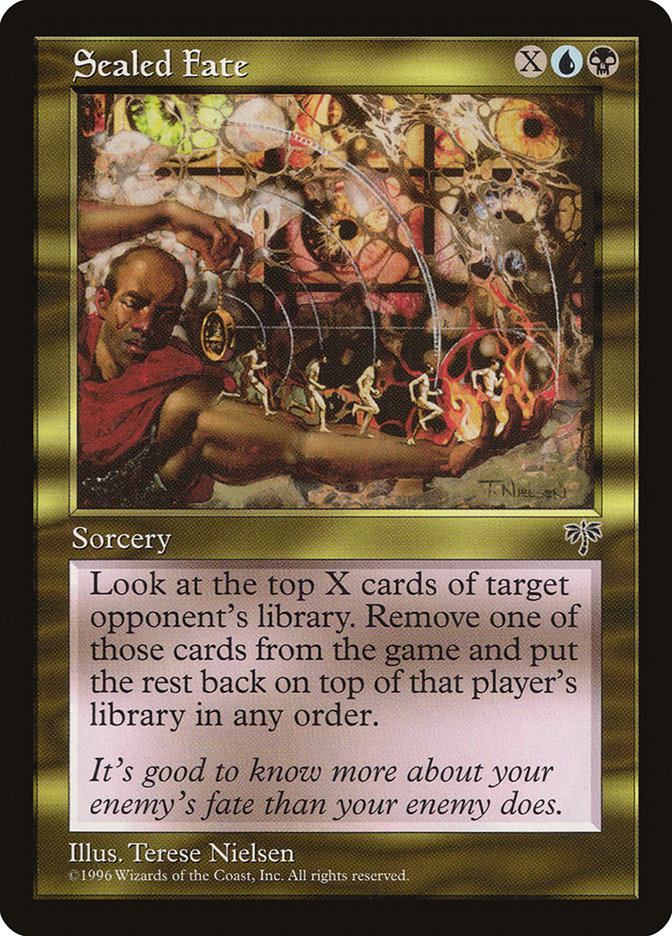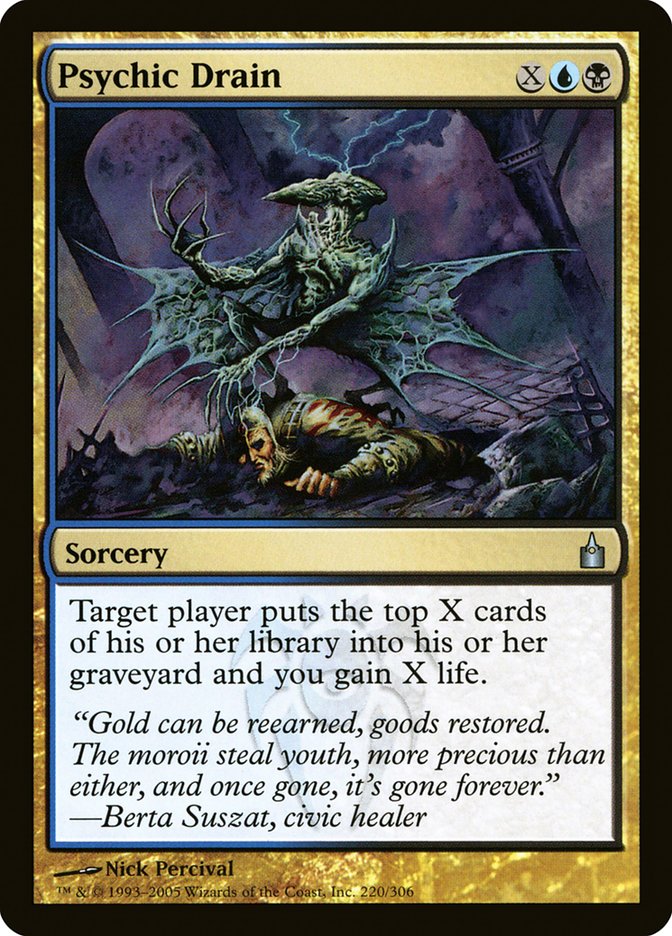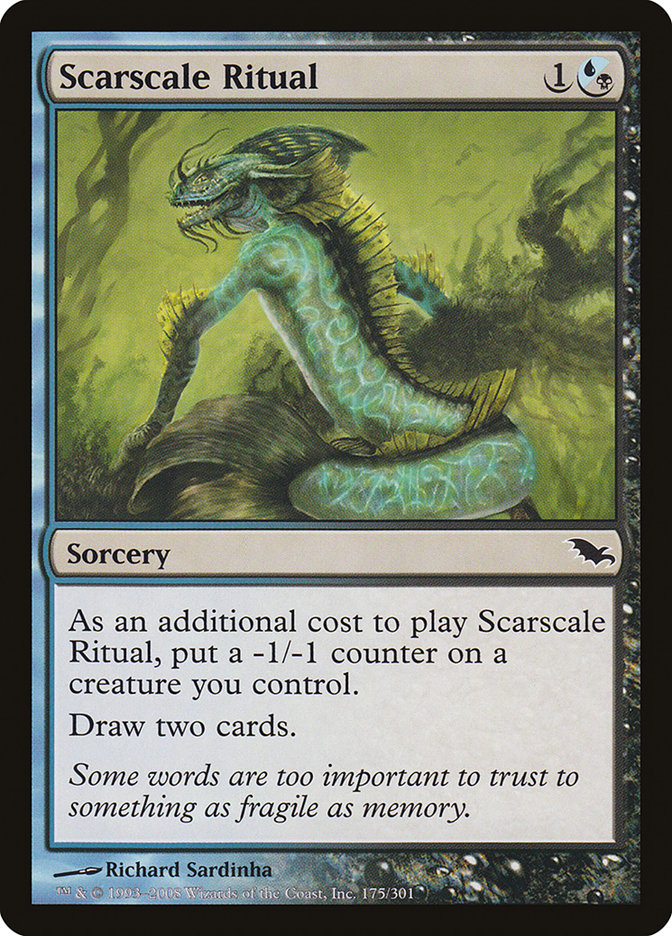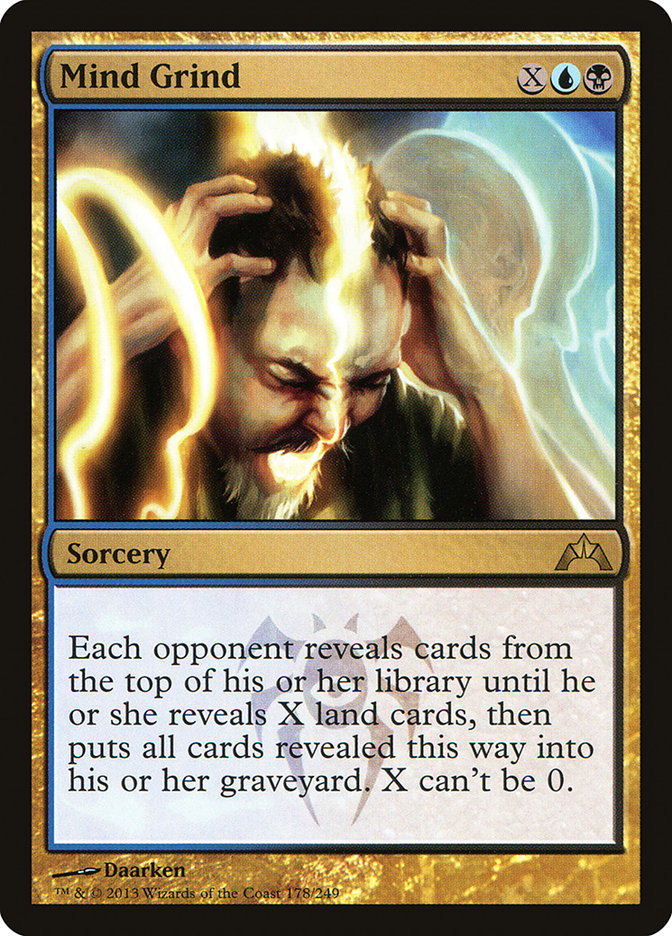Paranoid Delusions MTG Card
| Mana cost | |
| Converted mana cost | 2 |
| Rarity | Common |
| Type | Sorcery |
| Abilities | Cipher,Mill |
| Released | 2013-02-01 |
| Set symbol | |
| Set name | Gatecrash |
| Set code | GTC |
| Number | 186 |
| Frame | 2003 |
| Layout | Normal |
| Border | Black |
| Illustred by | Christopher Moeller |
Text of card
Target player puts the top three cards of his or her library into his or her graveyard. Cipher (Then you may exile this spell card encoded on a creature you control. Whenever that creature deals combat damage to a player, its controller may cast a copy of the encoded card without paying its mana cost.)
Cards like Paranoid Delusions
Paranoid Delusions provides an interesting take on the milling strategy in Magic: The Gathering. It’s directly relatable to other mill cards such as Glimpse the Unthinkable, which efficiently mills a substantial ten cards for just two mana. Paranoid Delusions, though not as potent in its immediate impact, has the upper hand with its cipher ability, allowing you to cast it multiple times throughout the game without using more cards from your hand.
Another card in the same vein is Mind Sculpt, which mills the opponent for seven cards at the cost of two mana. It has a decent mill-to-mana cost ratio but lacks the recursive capability of Paranoid Delusions. There’s also Breaking, which targets an opponent’s library for eight cards, sitting comfortably between the two in terms of cost-effectiveness. Yet again, it falls short of the repeatability that cipher grants Paranoid Delusions.
Evaluating the group collectively, Paranoid Delusions stands out in terms of potential long-term value. If paired with creatures that can reliably hit the opponent, it can turn every combat phase into an opportunity to whittle down an opponent’s library, making it a strong contender in decks dedicated to the milling win condition.
Cards similar to Paranoid Delusions by color, type and mana cost
Card Pros
Card Advantage: Paranoid Delusions can potentially go through a significant portion of your opponent’s library and work towards decking them, silently contributing to a win through an alternative method.
Resource Acceleration: Although not directly providing mana or acceleration, this card can fuel strategies involving graveyard synergies, enabling further play options and interactions that benefit from cards your opponents discard.
Instant Speed: While Paranoid Delusions operates at sorcery speed, its cipher ability grants versatility, allowing you to cast the encoded spell whenever the creature it’s attached to deals combat damage to a player, effectively functioning at instant speed after initial setup.
Card Cons
Discard Requirement: One of the drawbacks of Paranoid Delusions is its need to discard cards, particularly when your hand is already depleted. This adds strain to your card resources and could potentially leave you at a disadvantage during a match if you’re unable to maintain a robust hand size.
Specific Mana Cost: The casting cost of Paranoid Delusions requires both blue and black mana. This specificity can restrict the card’s flexibility, making it less desirable in decks that aren’t focused on this color combination or run a wider array of colors where achieving the correct mana can be more challenging.
Comparatively High Mana Cost: With its milling effect considered alongside its mana cost, the card can appear costly for the impact it has on the game. There are alternative cards in MTG that can induce a more significant milling effect or offer better value for the same or less investment.
Reasons to Include in Your Collection
Versatility: Paranoid Delusions offers an efficient way to support mill strategies across different formats. Its cipher ability allows for repeated use, making it a flexible addition to decks that aim to disrupt the opponent’s plan by targeting their library.
Combo Potential: As a card that excels in a specific niche, Paranoid Delusions thrives in environments where it can be combined with creatures that can reliably deal combat damage to a player, maximizing the milling effect with each Cipher trigger.
Meta-Relevance: In a game state where graveyard-based decks or strategies are prevalent, Paranoid Delusions can serve as a deterrent or counter by removing key components from opponents’ decks, reducing the effectiveness of their tactics and providing you with a strategic edge.
How to beat
Paranoid Delusions from Magic: The Gathering presents an intriguing challenge with its mill and cipher abilities, allowing players to wear down their opponent’s deck by repetitively encoding it onto a creature. To effectively counter this card, players should prioritize instant-speed removal to disrupt the ciphered creature before the ability triggers. Ensnaring creatures with cards like Unsummon or using spot removal such as Fatal Push can hinder the milling process before it takes a toll on your deck’s resources.
Another tactic is to use graveyard shuffling effects, such as the effect of the card Gaea’s Blessing, to recycle cards back into your library. By doing so, the milling impact of Paranoid Delusions is mitigated. Additionally, having enchantment removal on hand, like Naturalize or Disenchant, can address any persistent threats that hinge on enchantments boosting Paranoid Delusions’ efficiency.
Ultimately, a well-timed removal or graveyard management strategy can make Paranoid Delusions far less daunting. It’s imperative to control the board and keep your library protected to ensure this spell does not tip the scales in your opponent’s favor.
Where to buy
If you're looking to purchase Paranoid Delusions MTG card by a specific set like Gatecrash, there are several reliable options to consider. One of the primary sources is your local game store, where you can often find booster packs, individual cards, and preconstructed decks from current and some past sets. They often offer the added benefit of a community where you can trade with other players.
For a broader inventory, particularly of older sets, online marketplaces like TCGPlayer, Card Kingdom and Card Market offer extensive selections and allow you to search for cards from specific sets. Larger e-commerce platforms like eBay and Amazon also have listings from various sellers, which can be a good place to look for sealed product and rare finds.
Additionally, Magic’s official site often has a store locator and retailer lists for finding Wizards of the Coast licensed products. Remember to check for authenticity and the condition of the cards when purchasing, especially from individual sellers on larger marketplaces.
Below is a list of some store websites where you can buy the Paranoid Delusions and other MTG cards:
 BUY NOW
BUY NOW BurnMana is an official partner of TCGPlayer
- eBay
- Card Kingdom
- Card Market
- Star City Games
- CoolStuffInc
- MTG Mint Card
- Hareruya
- Troll and Toad
- ABU Games
- Card Hoarder Magic Online
- MTGO Traders Magic Online
See MTG Products
Legalities
Magic the Gathering formats where Paranoid Delusions has restrictions
| Format | Legality |
|---|---|
| Commander | Legal |
| Legacy | Legal |
| Paupercommander | Legal |
| Modern | Legal |
| Oathbreaker | Legal |
| Pauper | Legal |
| Vintage | Legal |
| Duel | Legal |
| Pioneer | Legal |
| Penny | Legal |
Rules and information
The reference guide for Magic: The Gathering Paranoid Delusions card rulings provides official rulings, any errata issued, as well as a record of all the functional modifications that have occurred.
| Date | Text |
|---|---|
| 2013-04-15 | If a creature with an encoded card deals combat damage to more than one player simultaneously (perhaps because some of the combat damage was redirected), the triggered ability will trigger once for each player it deals combat damage to. Each ability will create a copy of the exiled card and allow you to cast it. |
| 2013-04-15 | If another player gains control of the creature, that player will control the triggered ability. That player will create a copy of the encoded card and may cast it. |
| 2013-04-15 | If the creature leaves the battlefield, the exiled card will no longer be encoded on any creature. It will stay exiled. |
| 2013-04-15 | If the spell with cipher doesn’t resolve, none of its effects will happen, including cipher. The card will go to its owner’s graveyard and won’t be encoded on a creature. |
| 2013-04-15 | If you choose not to cast the copy, or you can’t cast it (perhaps because there are no legal targets available), the copy will cease to exist the next time state-based actions are performed. You won’t get a chance to cast the copy at a later time. |
| 2013-04-15 | If you want to encode the card with cipher onto a noncreature permanent such as a Keyrune that can turn into a creature, that permanent has to be a creature before the spell with cipher starts resolving. You can choose only a creature to encode the card onto. |
| 2013-04-15 | The copy of the card with cipher is created in and cast from exile. |
| 2013-04-15 | The exiled card with cipher grants a triggered ability to the creature it’s encoded on. If that creature loses that ability and subsequently deals combat damage to a player, the triggered ability won’t trigger. However, the exiled card will continue to be encoded on that creature. |
| 2013-04-15 | The spell with cipher is encoded on the creature as part of that spell’s resolution, just after the spell’s other effects. That card goes directly from the stack to exile. It never goes to the graveyard. |
| 2013-04-15 | You cast the copy of the card with cipher during the resolution of the triggered ability. Ignore timing restrictions based on the card’s type. |
| 2013-04-15 | You choose the creature as the spell resolves. The cipher ability doesn’t target that creature, although the spell with cipher may target that creature (or a different creature) because of its other abilities. |
